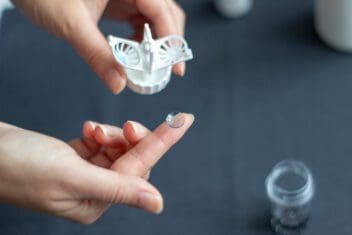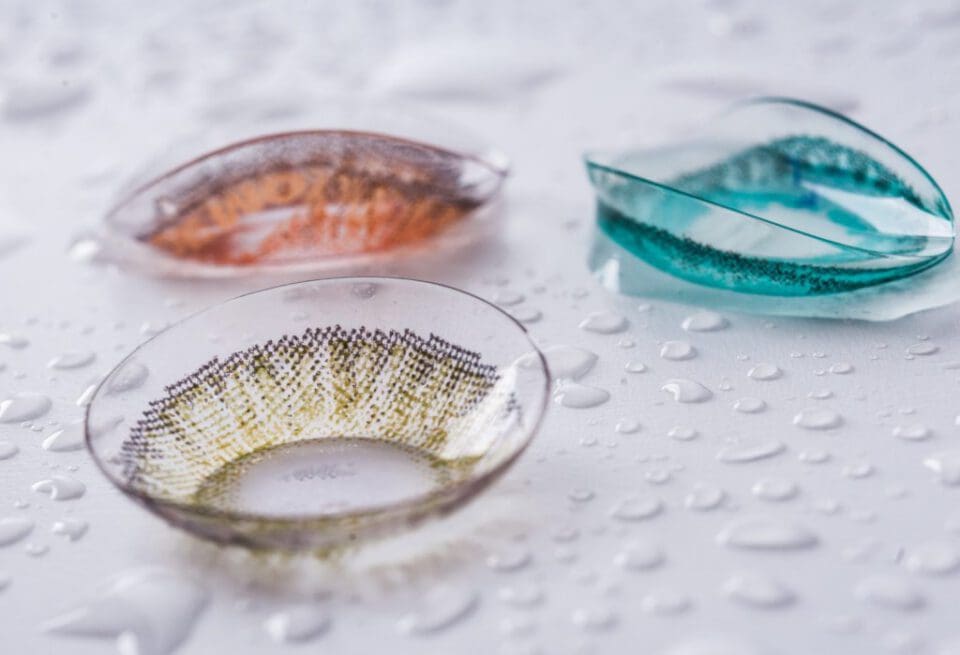Further Reading
Do Contacts Really Expire? (When You Can & Can’t Wear Them)
Home / Understanding Contacts /
Last Updated:
Do contacts expire? All contacts have a set expiration date. Check the packaging that your contacts came in to find what their expiration date is, so you can avoid complications associated with wearing expired contacts.
Table of Contents
Wearing expired contacts is one of the leading causes of eye infections in the U.S. Risks of wearing contact lenses past their expiration date include inflammation and reddening of the eye, moderate to severe pain, and partial or total loss of vision.
There are different types of contacts available to fit different vision needs, all of which have expiration dates.

Eye care experts strongly suggest using contacts before their expiration dates. Even unopened contacts that have expired can get a buildup of deposits on them and are no longer safe to wear.
Adhering to proper contact use is the best way to reduce your likelihood of encountering risks related to contact lenses. Proper lens hygiene includes cleaning your lenses well, storing them properly, frequently replacing your lenses case, giving your eyes time to rest without contacts in, and never trying to extend contact use beyond their expiration date.
Do Contacts Expire?
All contacts have an expiration date. Some are designed to last for one year, while others are meant to be worn for only two weeks or as little as one day.
As contacts are worn, germs, proteins, and other residues accumulate on the surface of your contacts. These deposits can irritate the eyes over time.
In order to avoid irritation caused by old contacts, it is important to replace your lenses as recommended. Even if you use proper contact lens hygiene, the lenses are meant to be discarded and replaced, as indicated by the lens manufacturer.
In addition to contact lenses expiring, contact lens prescriptions also expire. In 2004, the Food and Drug Administration (FDA) passed a law that all contact lens prescriptions expire after one year or as otherwise established by state law, depending on which is greater. Contact lenses and their prescriptions have expiration dates to ensure that you are receiving appropriate medical products and to identify any complications associated with their use.
Problems Caused by Wearing Expired Contacts

There are a number of risks associated with wearing old contact lenses. Improper lens hygiene and ignoring expiration dates are two of the main causes of eye infections related to contact lens use. According to the Centers for Disease Control and Prevention (CDC), poor contact lens hygiene is a major risk factor for a range of eye problems.
Problems associated with wearing expired or poorly cared for contacts include:
You deserve clear vision. We can help.
With 135+ locations and over 2.5 million procedures performed, our board-certified eye surgeons deliver results you can trust. Your journey to better vision starts here.
- Inflammation of the cornea.
- Moderate to intense eye pain.
- Sensitivity to light.
- Red eye.
- Partial or total loss of vision.
- Infection.
- Scarring.
The CDC reports that approximately 99 percent of people wearing contact lenses report at least one contact lens hygiene behavior that increases their risk of eye infection or inflammation. Approximately 40 to 90 percent of contact lens wearers don’t follow proper care instructions for the lenses. Nearly 1 million doctor visits each year are due to keratitis, a painful eye infection associated primarily with poor contact lens use.
Types of Contacts & Their Expiration
With an estimated 45 million people in the U.S. who wear contact lenses, it is no surprise that many different types of contact lenses have been developed. There are a few main types of contact lenses, explains the FDA.
Types of contact lenses include:
- Soft contacts. Available in both extended wear and disposable forms, these lenses are made of soft and flexible plastics so oxygen can pass through to the cornea. They are relatively easy to adjust to and more comfortable than rigid lenses.
- Rigid gas permeable (RGP) lenses. Although they are more rigid than soft lenses, RGP lenses are more reliable and more resistant to the buildup of deposits. They typically produce clearer vision.
- Extended wear contacts. Designed for overnight or continuous wear, these lenses can be worn from one to six nights or for up to one month during the day. They are typically soft contact lenses, though there are a few RGP lenses approved for overnight wear.
- Disposable contacts. As defined by the FDA, disposable contacts are meant to be used once and then discarded. A brand new pair of lenses is meant to be worn each day.
- Replacement schedule contacts. Replacement schedule lenses are designed to be worn for a set period of time, such as one day, two weeks, or one month. The lenses may be worn continuously for the prescribed amount of time and must be then thrown away.
- Decorative contacts. All the same rules and regulations of contact lens care and expiration apply to decorative lenses, worn for cosmetic or costume purposes. Decorative lenses should still be obtained through a prescription, whether you need them for vision correction or not.

How Firm Is the Expiration Date?
Eye care professionals urge individuals to use contacts before they expire. Even unopened contacts can go bad when it’s past their expiration date. Contact lenses are packed in a solution that acts as a preservative, but over time, the solution also expires. At that point, it can no longer keep the contacts sterile and safe to use.
Many contacts have far-away expiration dates, up to a couple of years. If you have lenses that were manufactured more than a couple years ago, it is best not to use them. Using contact lenses that are past their expiration date greatly increases your risk of eye infection and other complications.
If you are concerned about wasting contacts that will expire soon, eye care professionals recommend using your lenses in order of oldest to newest, as long as none of the lenses are actually past their expiration date. This way, older lenses won’t be forgotten about or need to be thrown away because they have expired.
How Do I Find My Expiration Date?
Expiration dates of contact lenses are usually printed on the containers of individual lenses. Specifically, you can find the expiration date of your pair of lenses on the foil cover of your container. You can also find other information about your lenses here, including:
- Lens’s brand name
- Manufacturer name
- Lens diameter
- Contact lens material
- Lot number
- Base curve of the lens
- And most importantly, the expiration date
If for some reason you can’t find the date on which your contacts expire, you can start by contact your eye doctor’s office. Technicians there should be able to answer your question or else point you in the direction of the manufacturer to help you find the date you’re looking for.
It’s important to check the expiration date before buying or using any contact lens. This might just save you future complications like eye infections or other eye health issues.
You deserve clear vision. We can help.
With 135+ locations and over 2.5 million procedures performed, our board-certified eye surgeons deliver results you can trust. Your journey to better vision starts here.
What to Do If You’ve Been Wearing Expired Contact Lenses
Wearing expired contacts can present several undesired ocular health outcomes. Once the expiration date elapses, the solution that preserves the lenses will more likely be infiltrated with fungal, bacterial, and amoebae pathogens. These pathogens can increase the risk of infections, discomfort, and potential permanent blindness.
The best solution to take when you realize that your contacts have expired is to seek medical attention immediately from your eye doctor.
What to Do If Your Contact Lens Solution Expires
When you realize that your contact lens solution has expired, you should not wear them. Instead, you can seek medical advice from your eye care doctor on the next step forward. Your doctor will likely suggest that you get new contacts that have not expired yet and are safe to use.
Even if you maintain proper contact lens hygiene, they are still meant to be replaced after some time, as indicated by their manufacturers. Taking care of your lenses does not necessarily mean that they will be safe to wear.
Proper Contact Use
Adhering to proper contact use is the best way to ensure that you don’t experience complications, such as infections caused by your contact lenses. The American Academy of Ophthalmology (AOA) recommends sticking to the following steps in order to avoid contact lens infections:
- Rub lenses when you clean them to loosen buildup of proteins and bacteria on the lens.
- Always rinse and store contact lenses in store-bought contact lens solutions.
- Replace the case for your contact lenses at least three times per year.
- Let your eyes rest without contact lenses in them from time to time, especially overnight.
- Always get new contact lenses when recommended. Don’t try to extend use beyond their expiration date.
You deserve clear vision. We can help.
With 135+ locations and over 2.5 million procedures performed, our board-certified eye surgeons deliver results you can trust. Your journey to better vision starts here.
References
- Estimated Burden of Keratitis. (November 2014). Centers for Disease Control and Prevention.
- Healthy Contact Lens Wear and Care. (July 2018). Centers for Disease Control and Prevention.
- Six Steps to Avoid Contact Lens Infections. (May 2019). American Academy of Ophthalmology.
- The Risks of Wearing Old Contact Lenses. Michigan Eye Institute.
- Types of Contact Lenses. (January 2018). Food and Drug Administration.
- Why Does a Contact Lens Prescription Expire? (May 2019). Verywell Health.
This content is for informational purposes only. It may have been reviewed by a licensed physician, but is not intended to serve as a substitute for professional medical advice. Always consult your healthcare provider with any health concerns. For more, read our Privacy Policy and Editorial Policy.